
 Highly Recommended ***** There was an undeniable sense of tension and anticipation at the Lyric Opera’s opening of its new original production of Macbeth. Obviously, the big story was that it was happening at all, the Lyric’s first live performance in over eighteen months. And for the beginning of his tenure as the Lyric’s Music Director, (only its third ever,) conductor Enrique Mazzola didn’t shy away from acknowledging the moment. When the Lyric announced they would be performing Verdi’s adaptation of Shakespeare’s bloodiest play two years ago, it was meant to be part of a cross-season series on Verdi’s early works. With that plan having hiccupped during the pandemic, Mazzola and director Sir David McVicar opted instead to perform Verdi’s mature Parisian revision of the opera, known for its expanded character study and meditative overtures, and for its central concept to be the danger lurking in communal spaces, particularly to children.
Highly Recommended ***** There was an undeniable sense of tension and anticipation at the Lyric Opera’s opening of its new original production of Macbeth. Obviously, the big story was that it was happening at all, the Lyric’s first live performance in over eighteen months. And for the beginning of his tenure as the Lyric’s Music Director, (only its third ever,) conductor Enrique Mazzola didn’t shy away from acknowledging the moment. When the Lyric announced they would be performing Verdi’s adaptation of Shakespeare’s bloodiest play two years ago, it was meant to be part of a cross-season series on Verdi’s early works. With that plan having hiccupped during the pandemic, Mazzola and director Sir David McVicar opted instead to perform Verdi’s mature Parisian revision of the opera, known for its expanded character study and meditative overtures, and for its central concept to be the danger lurking in communal spaces, particularly to children.
A destroyed church looms over the haze of a mid-nineteenth century battlefield. Within, black-clad judgmental women look over their hymnals, three very dour children they acquired somewhere in tow. These are the witches, in McVicar’s production an unusually sour lot, though Verdi’s music gives them an off kilter, jibing sensibility. Macbeth, played by bass-baritone Craig Colclough in his Lyric debut, intrudes by bounding in waving his bloody sword, along with cautious Banquo (bass-baritone Christian Van Horn), and the familiar story begins. But this time, it is limited to set designer John MacFarlane’s church, where the Macbeths and their rivals are unable to escape each other as their sanity, tenuous to begin with, rapidly spirals out.
Verdi’s adaptation is quite faithful; most experienced theatre-goers will hardly need the supertitles, and though they moved the time period to Verdi’s, McVicar and his team have taken their inspiration from Shakespeare’s text. Specifically, from Lady Macbeth’s line in Shakespeare implying that she and her husband once had a child, but don’t anymore. In Colclough and Sondra Radvanovsky’s performances, grief and bitter envy toward other parents seethe in every line. Colclough has a strong vibrato and he sounds giddy when he first hears the witches prophecy; Macbeth’s loping gait could be taken for exhaustion and adrenaline. It is when we see him get drunk at the ghostly banquet that we realize Macbeth is always drunk, and that Lady Macbeth long ago made propping him up her sole purpose.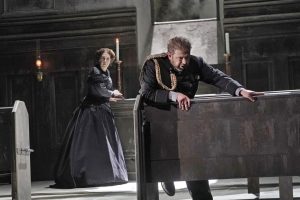
This is bel canto soprano Radvanovsky’s debut in the role of Lady Macbeth, and she brings fresh passion to her experienced technique. Verdi’s revision gave Lady Macbeth several more arias devoted to her loneliness, guilt, and familiarity with hell, portraying her not as so much as an instigator but as in over her head from the beginning. She seems to view herself as only supporting what Macbeth has decided to do already, bracing herself to deliver the bloodthirsty declarations he demands and shrinking into herself when he looks away. As with many Verdi operas, Macbeth has an act that ends with its leads taking a bombastic oath to seek vengeance, but in this dilapidated setting, with so much pain on display, they just seem so small and mean.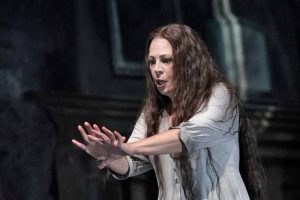
Despite the darkness of the subject matter and the seriousness with which the creative team takes it, Verdi’s music is lively and often incongruously happy. Not only are the witches’ choruses impishly sardonic, but so is that of the murderers. Only the outraged Scottish civilians occasionally burst forth with the grim cries to heaven more typical of grand opera. The Paris version also includes a ballet that is quite lovely, here rendered as Macbeth’s most vulnerable moment with the mysterious children the witches have apparently enslaved and who take over much of the witches’ role in the narrative. At the risk of forcing too much of a delta theme onto a production that was in the works before this fall, there seems to be something to the idea of children being both the most vulnerable people in the community and the vector by which danger spreads. The Lyric’s comeback is not the greatest display of spectacle the space is capable of, and while it doesn’t look cheap and the refurbished house is a welcome change, the production isn’t a sudden burst back into the glitz of season openings in past years. But Macbeth was always a psychological and interior story made to flourish within the low tech of Shakespeare’s stage, and Mazzola’s conducting certainly brings forth a sound as eloquent and empathic as Shakespeare’s words.
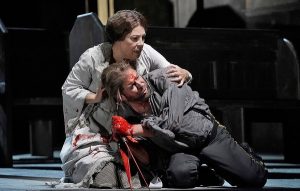 Macbeth will continue at the Lyric Opera House, 20 N Upper Wacker Drive, Chicago, thru October 9, with the following showtimes:
Macbeth will continue at the Lyric Opera House, 20 N Upper Wacker Drive, Chicago, thru October 9, with the following showtimes:
September 23: 2:00 pm
September 30: 7:00 pm
October 3: 2:00 pm
October 6: 2:00 pm
October 9: 7:30 pm
Running time is three hours with one intermission.
Performances are in Italian with English supertitles.
The Lyric offers parking deals with Poetry Garage at 201 W Madison St. if inquired about in advance.
Tickets start at $39; to order, visit LyricOpera.org or call 321-827-5600.
To see what others are saying, visit www.theatreinchicago.com, go to Review Round-Up and click at “Macbeth.”


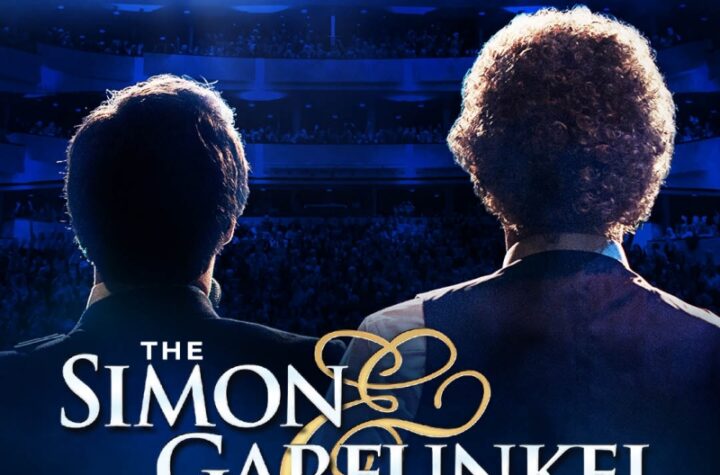


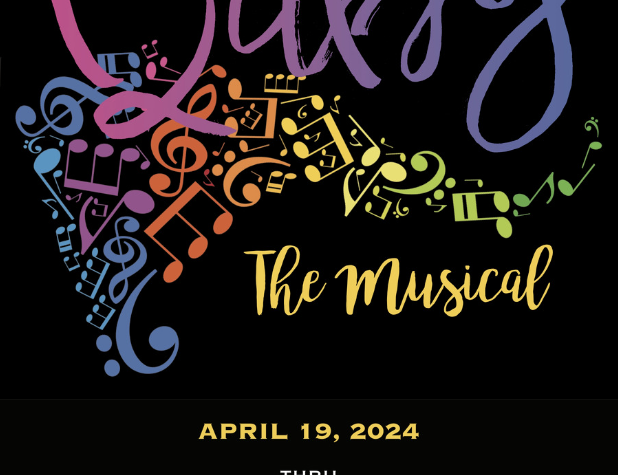
More Stories
“How to Know the Wild Flowers: A Map” reviewed by Julia W. Rath
“Baby: the Musical”
“Nana” reviewed by Jacob Davis